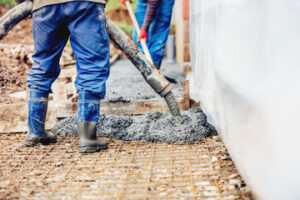Concrete Contractors Dallas TX ensure that projects are completed on time, within budget, and meet all structural standards. They are able to work much faster than the average Joe because they have years of experience and know what they’re doing.

A great concrete contractor will balance job site experience with office skills in managing paperwork and the financial aspects of running a business. Here are six questions to consider when choosing a concrete contractor:
Concrete contractors are professionals who specialize in the construction and repair of concrete structures. They are experienced in working on a variety of different types of projects, including foundations, driveways, and sidewalks. They are also knowledgeable about the material and how to best use it in a variety of applications. This includes using it to build durable outdoor features that can withstand harsh weather conditions and heavy traffic.
When choosing a concrete contractor, it’s important to ask about their experience and past work. A good contractor should be able to provide you with a portfolio of previous projects that showcases their skills and capabilities. This will help you determine whether they are the right fit for your project.
If you’re looking for a concrete contractor to complete a large commercial project, be sure to choose one with extensive experience in that type of construction. This will ensure that the contractor is familiar with the specifications and deadlines of the project. It will also help them ensure that the project is completed on time and within budget.
A reputable concrete contractor will be able to provide you with a detailed estimate of the project’s cost and timeline. They will also be able to answer any questions you may have about the project. They should be able to communicate clearly and effectively with you throughout the process, so you can be confident that they will finish the job on time and on budget.
In addition to the skills and knowledge that they have in the field, a reputable concrete contractor will also have the proper tools to complete the job. This includes the right type of truck to haul the concrete as well as the necessary equipment to mix and pour it. They should also have the correct safety gear to protect themselves from falling debris or getting crushed by machinery.
Concrete contractors are usually self-employed individuals, but they can also be part of a larger company that specializes in concrete services. Many of them are certified by the American Concrete Institute, which demonstrates that they have met certain standards and requirements for their trade. In addition, they must have a valid license to work in the field and liability insurance in case of an accident.
License
If you’re interested in starting a concrete business, there are several steps you need to take to ensure you’re licensed properly. You can visit your local courthouse or city clerk to find out about all the licensing requirements for your area. Depending on your region, you may also need to obtain a permit for a specific type of work. You can also check with your local government or business development center for more information. There are also companies that specialize in identifying all the state and local licenses you need to start your business.
A license is a requirement for any contractor who wants to work in the construction industry. The exact requirements vary by state, but they generally include a certain number of years of experience and passing an exam. In addition, some states require that you carry worker’s compensation insurance and get a bond.
You should always ask to see a copy of the license before hiring a concrete contractor. If the company does not have a valid license, you should consider finding another one. You should also make sure to read the terms and conditions of the license to understand what you’re getting into.
To become a concrete contractor in California, you must have four years of journeyman-level experience and pass the two-part state exam with the Contractors State License Board. You can substitute education, technical training, or apprenticeship training for some of your experience, but you must provide documentation of this. You also need to pass a background and criminal history check. The CSLB handles these issues on a case-by-case basis, so you should be prepared to discuss your past criminal record if they ask.
Many people use concrete in their homes or commercial projects, but not everyone knows that it requires a special license to work with it. The licensing process varies by state, but in most cases it requires a minimum of four years of work experience, a trade exam, and worker’s compensation insurance.
Some states require a separate license for concrete contractors, while others include them in a general contractor’s or builder’s license. In addition, some states have different educational requirements for becoming a concrete contractor.
Insurance
Getting the right concrete contractor insurance is vital for the success of any business. Insurance can help protect you from legal action and allow you to focus on your work without worry. You may also want to consider getting performance bonds, which are insurance policies that help you cover the costs of unfinished work if a client is not happy with your services.
General liability insurance is a must for any concrete or cement contractor, as it helps pay for legal fees and damage to third-party property caused by your company. It also covers damage to the property of clients due to your work. In fact, many general contractors require you to carry this type of insurance before they let you on their construction sites.
Workers’ compensation insurance is another important policy that can protect you if an employee gets injured on the job. This is because working with concrete and cement can be a very dangerous job.
Whether it’s an accident with a piece of machinery or tripping over a heavy ladder, employees can get seriously injured on the job. That’s why it’s so important to encourage your employees to follow proper safety protocol and protect them with this insurance.
Professional liability insurance, or errors and omissions insurance, can also come in handy for concrete contractors. If a mistake on your part leads to injury or damage, this type of policy can help pay for legal fees and damages.
A latent defect insurance policy can also be a good idea for concrete contractors. This type of policy resolves issues that arise months after the project is finished. It can help pay for repairs or rebuilding if structural problems are discovered at the site.
Commercial property insurance is a must for concrete businesses, as it can cover the cost of replacing or repairing business property. It can cover damage from common perils like fire, flood, wind damage, and vandalism. It can also include coverage for a building or structures, equipment and supplies, inventory, and personal belongings.
Lastly, you’ll need commercial auto insurance if your employees use vehicles in the course of their work. This type of policy can cover any vehicles owned by your company as well as any that are rented or loaned to your employees. It can also pay for any medical expenses that result from an auto accident involving one of your employees.
Availability
Concrete contractors have a wide range of skills that they can use to help their clients with their construction needs. Some of these include formwork, steel reinforcement, batching, mixing, delivery, placement, finishing, and curing. They also need to know how to read blueprints and follow directions. Additionally, they should be able to handle heavy machinery and operate a concrete mixer. In addition, they should be able to perform other work as needed on the job site.
Concrete contractors can build new concrete structures and repair existing ones. They can also make changes to the design of a structure and add features like patios and walkways. These professionals can even build concrete walls for homes and businesses. In some cases, they can also do masonry or carpentry on the project site. This will save the client time and money since they won’t have to hire multiple contractors for different tasks.
While working with a concrete contractor, you should be sure to keep him or her updated on the progress of the work. This will help ensure that everyone is on the same page and that the work is being completed at a reasonable pace. This can be done by text or email, although some contractors prefer to utilize project management software to provide updates to their supervisors and other contractors on the job site.
A good concrete contractor will be able to communicate well with the supervisors of other trades on the job site and answer any questions that they may have. They will also be able to give helpful suggestions that can improve the quality of the finished product. This is a sign that the contractor is dedicated to his or her work and wants to do a great job.
A good concrete contractor will have insurance and bonding in case of any damage that occurs to your property while the contractor is on the job site. This is especially important if the work is being done on a commercial site. A contractor who is not properly insured could face a lot of trouble if something goes wrong on the job.
